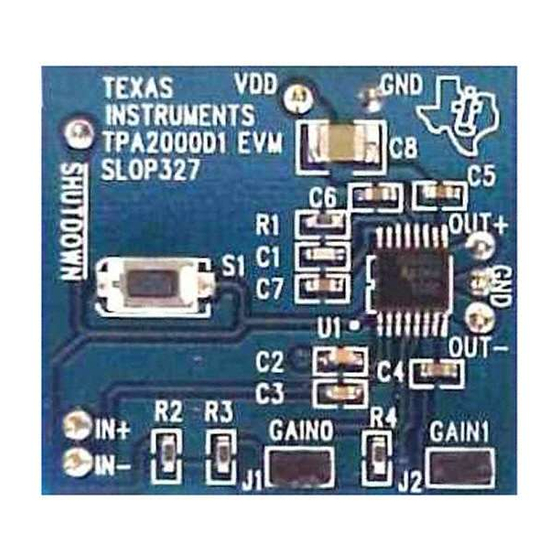
Summary of Contents for Texas Instruments TPA2000D1
- Page 1 TPA2000D1 Filterless Class D Audio Power Amplifier EVM User’s Guide 2001 Mixed-Signal Products SLOU083A...
-
Page 2: Read This First
TI Plug-N-Play Audio Amplifier Evaluation Platform (literature number SLOU011) provides detailed information on the evaluation platform and its use with TI audio evaluation modules. TPA2000D1 2-W Mono Class-D Audio Power Amplifier (literature number SLOS328) This is the data sheet for the TPA2000D1 audio amplifier integrated circuit. - Page 3 Running Title—Attribute Reference FCC Warning This equipment is intended for use in a laboratory test environment only. It generates, uses, and can radiate radio frequency energy and has not been tested for compliance with the limits of computing devices pursuant to subpart J of part 15 of FCC rules, which are designed to provide reasonable protection against radio frequency interference.
- Page 4 ....... . Tables 2–1 Typical TI Plug-N-Play Platform Jumper and Switch Settings for the TPA2000D1 ..2–2 Typical TPA2000D1 EVM Jumper Settings .
-
Page 6: Introduction
Chapter 1 Introduction This chapter provides an overview of the Texas Instruments (TI) TPA2000D1 filterless class-D audio amplifier evaluation module (SLOU083). It includes a list of EVM features, a brief description of the module illustrated with a pictorial diagram, and a list of EVM specifications. -
Page 7: Feature Highlights
Feature Highlights 1.1 Feature Highlights The TI TPA2000D1 audio amplifier evaluation module and the TI plug-n-play audio amplifier evaluation platform include the following features: TPA2000D1 Mono 2-W Filterless Class-D Audio Power Amplifier Evaluation Module Class-D without output filter 2.7 V to 5.5 V supply voltage range... -
Page 8: Description
The TPA2000D1 filterless class-D mono audio power amplifier evaluation module is a complete, 2-W class-D audio power amplifier that can operate without an output filter. It consists of the TI TPA2000D1 class-D mono 2-W audio power amplifier IC along with a small number of other parts mounted on a circuit board that measures approximately 1-1/4 inches by 1-1/4 inches (see Figure 1–1. -
Page 9: Tpa2000D1 Evm Specifications
TPA2000D1 EVM Specifications 1.3 TPA2000D1 EVM Specifications Supply voltage range, V .......... -
Page 10: Operation
Chapter 2 Operation The steps in this chapter can be followed to quickly prepare the TPA2000D1 filterless class-D audio amplifier EVM for use. Using the TPA2000D1 with the TI plug-n-play audio amplifier evaluation platform is a quick and easy way to connect power, signal and control inputs, and signal outputs to the EVM using standard connectors. -
Page 11: Precautions
Precautions 2.1 Precautions Power Supply Input Polarity and Maximum Voltage Always ensure that the polarity and voltage of the external power connected to V power input connector J1, J2, and/or V power input connector J6 are correct. Overvoltage or reverse-polarity power applied to these terminals can open onboard soldered-in fuses and cause other damage to the platform, installed evaluation modules, and/or the power source. -
Page 12: Quick Start List For Platform
1) Ensure that all external power sources are set to OFF and that the platform power switch S1 is set to OFF. 2) Install a TPA2000D1 module in platform socket U3 or U4, taking care to align the module pins correctly. - Page 13 TPA2000D1 EVM SHUTDOWN SLOP327 OUT+ OUT– R2 R3 GAIN0 GAIN1 IN– Table 2–4. Typical TPA2000D1 EVM Jumper Settings GAIN1 GAIN0 GAIN (dB) 17.5 23.5 Note: ON = Jumper installed, OFF = Open, X = Don’t care Power Up 12) Verify correct voltage and input polarity and set the external power supply to ON.
-
Page 14: Quick Start List For Stand-Alone
Quick Start List for Stand-Alone 2.3 Quick Start List for Stand-Alone Follow these steps to use the TPA2000D1 EVM stand-alone or when connecting it into existing circuits or equipment. Connections to the TPA2000D1 module header pins can be made via individual sockets, wire-wrapping, or soldering to the pins, either on the top or the bottom of the module circuit board. - Page 15 Quick Start List for Stand-Alone Table 2–5. TPA2000D1 EVM Gain Settings GAIN1 GAIN0 GAIN (dB) 17.5 23.5 Note: ON = Jumper installed, OFF = Open, X = Don’t care Control inputs 7) SHUTDOWN: A low shuts down the amplifier IC on the module; a high allows normal operation.
-
Page 16: Reference
Reference 2.4 Reference 2.4.1 TPA2000D1 Filterless Class-D EVM Schematic The TPA2000D1 filterless class-D EVM schematic is shown in Figure 2–4. Figure 2–4. TPA2000D1 Class-D EVM Schematic Diagram OUT– TPA2000D1 BYPASS IN– 1 µF 1 µF AGND 1 µF SHUTDOWN SHUTDOWN... -
Page 17: Tpa2000D1 Audio Power Amplifier Evaluation Module Parts List
TPA2000D1 Audio Power Amplifier Evaluation Module Parts List 2.4.2 TPA2000D1 Audio Power Amplifier Evaluation Module Parts List Table 2–6. TPA2000D1 EVM Parts List Manufacturer/ Reference Description Size Qty. Part Number Capacitor, ceramic, 220 pF, ±5%, Phillips X7R, 50 V 06032R221K9B20D Capacitor, ceramic, 1.0 µF,... -
Page 18: Tpa2000D1 Filterless Class-D Evm Pcb Layers
TPA2000D1 Filterless Class-D EVM PCB Layers 2.4.3 TPA2000D1 Filterless Class-D EVM PCB Layers The following illustrations depict the TPA2000D1 filterless class-D EVM PCB layers. These drawings are not to scale. Gerber plots can be obtained from any TI sales office. - Page 19 2-10 Operation...
- Page 20 IMPORTANT NOTICE Texas Instruments and its subsidiaries (TI) reserve the right to make changes to their products or to discontinue any product or service without notice, and advise customers to obtain the latest version of relevant information to verify, before placing orders, that information being relied on is current and complete.











Need help?
Do you have a question about the TPA2000D1 and is the answer not in the manual?
Questions and answers